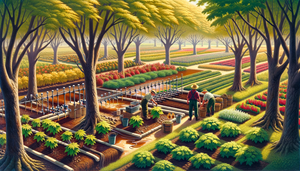Climate Resilience in Small Farms
Jul 23, 2024
The allure of maple syrup, with its rich, golden hue and sweet, comforting taste, has captivated the hearts of many. From drizzling over pancakes to adding depth to culinary creations, it’s a beloved staple. However, behind this delightful syrup lies a community of small-scale farmers who are preserving traditional methods and adapting to climate change challenges. This post delves into how these farms build climate resilience through diversified practices, ensuring that this treasured syrup continues to grace our tables.
The Challenge of Climate Change
Climate change poses significant threats to maple syrup production. Tapping maple trees depends on specific weather conditions: cold nights and warm days. With the increasing unpredictability of weather patterns, small farms face the challenge of maintaining consistent syrup production.
The Role of Diversification
Diversification is a key strategy for small-scale maple syrup farms to enhance their resilience. By incorporating a variety of practices, these farms not only secure their livelihood but also contribute to sustainable farming.
- Crop Diversification: Many maple syrup producers are expanding their operations to include other crops. This not only spreads the risk but also provides additional sources of income. For example, integrating crops like berries, vegetables, or even small orchards can help mitigate the financial impact of a poor syrup season.
- Agroforestry: Integrating trees and shrubs into agricultural systems can improve biodiversity and soil health. Farmers can create a more resilient ecosystem that supports the syrup production process by combining maple trees with other tree species.
- Sustainable Practices: Emphasizing sustainable farming practices, such as organic farming, reduces the environmental impact and enhances the farm’s resilience to climate fluctuations. Practices like composting, reduced tillage, and cover cropping improve soil and water retention, which are crucial for maintaining tree health.
Community and Knowledge Sharing
Small-scale maple syrup farmers often rely on community networks to share knowledge and resources. These networks are vital for learning new practices, technologies, and strategies to improve resilience. Local cooperatives and farming associations are crucial in fostering this collaborative environment.
Technology and Innovation
Embracing technology is another way these farms are adapting. From advanced weather monitoring systems to innovative tapping techniques, technology helps farmers optimize their production processes and respond more effectively to changing climate conditions.
Financial Support and Policy Advocacy
Small-scale farmers need access to financial resources and supportive policies. Government grants, subsidies, and insurance programs tailored for agricultural resilience can provide much-needed support. Additionally, advocating for policies that address climate change and support sustainable farming practices is crucial.
The Heart of Maple Syrup Production
Despite the challenges, the heart and soul of maple syrup production remain in the dedication and passion of the farmers. Their commitment to quality and sustainability ensures that each bottle of syrup is a product of tradition, innovation,resilience.
Benefits of Choosing Sustainable Maple Syrup
- Artisanal Quality: Small-scale farms focus on quality over quantity, ensuring a superior product.
- Environmental Impact: Supporting sustainable farms helps reduce your carbon footprint.
- Community Support: Small farm purchases support local economies and preserve farming traditions.
- Health Benefits: Organic and sustainably produced syrup is free from harmful chemicals and additives.
Frequently Asked Questions (FAQs)
Q: How does climate change affect maple syrup production? A: Climate change alters the weather patterns essential for sap flow, making production less predictable.
Q: What are some diversified practices small farms use? A: To build resilience, small farms incorporate crop diversification, agroforestry, and sustainable practices.
Q: How can consumers support climate-resilient maple syrup farms? A: Buying syrup from small, sustainable farms supports their efforts and promotes environmentally friendly practices.
Q: What benefits does sustainably produced maple syrup offer? A: It offers superior quality, environmental benefits, community support, and health advantages.
Small-scale maple syrup farms are a testament to resilience and innovation. By embracing diversified practices and sustainable methods, these farms are preserving a cherished tradition and securing their future in the face of climate change. Each syrup bottle represents a blend of hard work, tradition, and forward-thinking practices, ensuring that maple syrup's rich, wholesome sweetness continues to delight generations to come.


